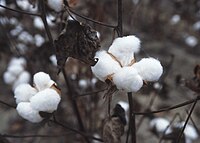
Preparation and identification of antioxidant peptides from cottonseed proteins.
Sign Up to like & getrecommendations! Published in 2021 at "Food chemistry"
DOI: 10.1016/j.foodchem.2021.129399
Abstract: The objective of this study was to investigate the antioxidant properties of cottonseed peptides. Results indicated that cottonseed peptides prepared by enzymatic hydrolysis and microbial fermentation both showed antioxidant properties. The cottonseed protein enzymatic hydrolysate… read more here.
Keywords: antioxidant peptides; preparation identification; peptides cottonseed; identification antioxidant ... See more keywords

Improving adhesion performance of cottonseed protein by the synergy of phosphoric acid and water soluble calcium salts
Sign Up to like & getrecommendations! Published in 2021 at "International Journal of Adhesion and Adhesives"
DOI: 10.1016/j.ijadhadh.2021.102867
Abstract: Abstract Cottonseed protein has great potential to replace formaldehyde-based adhesives due to the nature of non-toxicity, harmlessness, and non-pollution. Like soy protein-based adhesives, cottonseed protein-based adhesives also face a huge challenge in water resistance. In… read more here.
Keywords: adhesion performance; cottonseed protein; adhesion; water soluble ... See more keywords

Assessment and application of phosphorus/calcium-cottonseed protein adhesive for plywood production
Sign Up to like & getrecommendations! Published in 2019 at "Journal of Cleaner Production"
DOI: 10.1016/j.jclepro.2019.05.038
Abstract: Abstract Cottonseed protein is a potential alternative to formaldehyde-based adhesives as a renewable resource without negative environmental impact in use. Like other protein-based adhesives, unmodified cottonseed protein isolate needs improved water resistance. Thus, in this… read more here.
Keywords: cottonseed protein; production; plywood; calcium ... See more keywords

Identification of antibacterial peptides generated from enzymatic hydrolysis of cottonseed proteins
Sign Up to like & getrecommendations! Published in 2020 at "Lwt - Food Science and Technology"
DOI: 10.1016/j.lwt.2020.109199
Abstract: Abstract In this study, we explored the fractionation and identification of antibacterial peptides from cottonseed protein hydrolysates obtained using Alcalase. The cottonseed protein hydrolysates were preliminarily separated using Sephadex C-25, and fraction P5 exhibited antibacterial… read more here.
Keywords: cottonseed proteins; cottonseed; identification antibacterial; peptides generated ... See more keywords

Evaluation of adhesion properties of blends of cottonseed protein and anionic water-soluble polymers
Sign Up to like & getrecommendations! Published in 2018 at "Journal of Adhesion Science and Technology"
DOI: 10.1080/01694243.2018.1495404
Abstract: Abstract There is increasing interest in agro-based, biodegradable and eco-friendly wood adhesives as partial replacements for petroleum-based adhesives. In this work, we studied the adhesion of cottonseed protein isolate (CPI) blended with several anionic water-soluble… read more here.
Keywords: water; adhesion; poly; cpi ... See more keywords

Comparison of the wood bonding performance of water- and alkali-soluble cottonseed protein fractions
Sign Up to like & getrecommendations! Published in 2020 at "Journal of Adhesion Science and Technology"
DOI: 10.1080/01694243.2020.1850612
Abstract: Abstract The interests in biobased wood adhesives have been steadily increasing in recent years. Cottonseed protein isolate has shown potential as a renewable biobased adhesives. For a better understanding of the adhesive performance and mechanisms… read more here.
Keywords: bonding performance; water; performance; alkali soluble ... See more keywords

Isolation and identification of the angiotensin-I converting enzyme (ACE) inhibitory peptides derived from cottonseed protein: optimization of hydrolysis conditions
Sign Up to like & getrecommendations! Published in 2019 at "International Journal of Food Properties"
DOI: 10.1080/10942912.2019.1640735
Abstract: ABSTRACT Peptides derived from food proteins have exhibited significant antihypertensive effects without side effects. In this study, the cottonseed protein was hydrolyzed by papain for preparing peptide with angiotensin I converting enzyme (ACE) inhibitory activity.… read more here.
Keywords: hydrolysis conditions; cottonseed protein; inhibitory; ace inhibitory ... See more keywords

Effects of Replacing Fish Meal with Enzymatic Cottonseed Protein on the Growth Performance, Immunity, Antioxidation, and Intestinal Health of Chinese Soft-Shelled Turtle (Pelodiscus sinensis)
Sign Up to like & getrecommendations! Published in 2023 at "Aquaculture Nutrition"
DOI: 10.1155/2023/6628805
Abstract: The dietary effects of replacing fish meal with enzymatic cottonseed protein (ECP) on the growth performance, immunity, antioxidant, and intestinal health of Chinese soft-shelled turtles have not been explored. An eight-week feeding trial was conducted… read more here.
Keywords: group; cottonseed protein; enzymatic cottonseed; fish meal ... See more keywords

Effect of Nanocellulose on the Properties of Cottonseed Protein Isolate as a Paper Strength Agent
Sign Up to like & getrecommendations! Published in 2021 at "Materials"
DOI: 10.3390/ma14154128
Abstract: Currently, there is an increasing interest in the use of biopolymers in industrial applications to replace petroleum-based additives, since they are abundantly available, renewable and sustainable. Cottonseed protein is a biopolymer that, when used as… read more here.
Keywords: strength agent; paper strength; paper; cottonseed protein ... See more keywords

Application of Lignin-Containing Cellulose Nanofibers and Cottonseed Protein Isolate for Improved Performance of Paper
Sign Up to like & getrecommendations! Published in 2022 at "Polymers"
DOI: 10.3390/polym14112154
Abstract: There is current interest in replacing petroleum-based additives in consumer paper products with abundantly available, renewable and sustainable biopolymers such as lignin-containing cellulose nanofibers (LCNFs) and cottonseed protein. This research characterized the performance of cottonseed… read more here.
Keywords: containing cellulose; lignin containing; cottonseed protein; cellulose nanofibers ... See more keywords